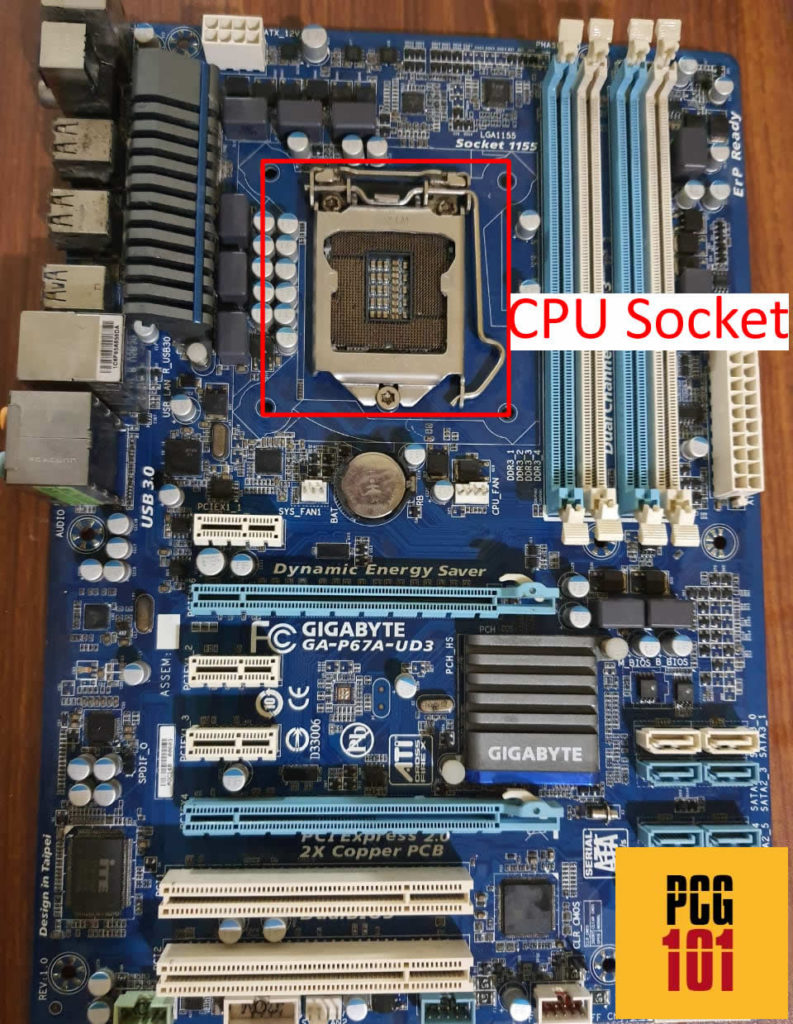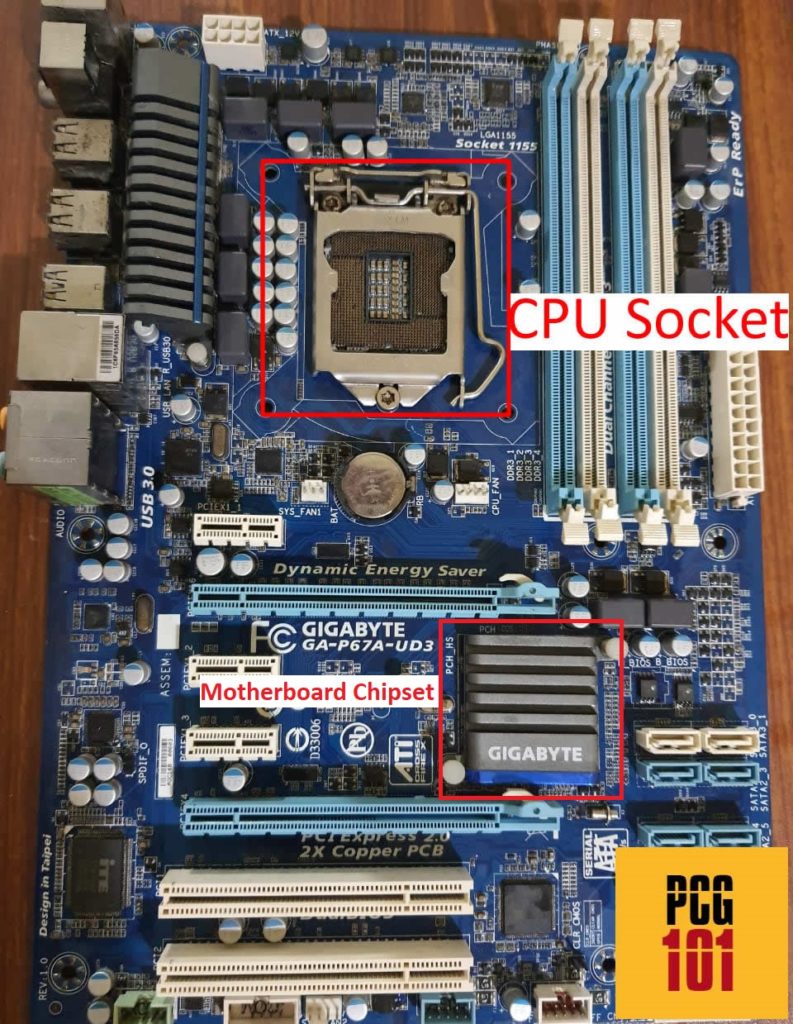If you have an AMD processor, that naturally means you have an AMD motherboard as well. Given this fact, the answer to the question, “Can I replace my AMD processor with an Intel processor?” is a NO. Unfortunately, you cannot.
CPUs are perhaps the only hardware components that are not compatible across brands. An Intel processor would be incompatible with an AMD system and vice versa.
While the rest of the components, such as RAM, hard drives, graphics cards, etc., can be used on an Intel or an AMD motherboard, the same cannot be said regarding the CPUs.
There is no workaround solution if you want to change an AMD processor with an Intel processor. In other words, you will HAVE to get a new compatible motherboard for your new CPU.
In the following text, I will discuss why you cannot replace an AMD processor with an Intel processor.
But first, you have to understand what a CPU socket is and how different CPUs use different sockets.
TABLE OF CONTENTS
Motherboard’s CPU Socket
You must understand that different CPUs require a compatible socket on the motherboard.
A socket is essentially the placeholder on a motherboard where the CPU plugs into.
So, in other words, not all CPUs are compatible with all motherboards.

A CPU socket is differentiated by its type and pin count. Desktop PCs generally use the Land Grid Array or Pin Grid Array type socket (LGA vs. PGA).
In addition to that, sockets have different pin counts, such as 1151, 1200, and 1700. These correspond to the pins on the CPUs as well.
So a 10th-generation Intel CPU has 1200 pins, whereas a 12th-generation CPU would have 1700 pins. The following table details this.
| CPU (series) | Socket | Pins | Type |
|---|---|---|---|
| Intel 7th Gen Core / Pentium / Celeron | LGA1151 | 1151 | LGA |
| Intel 8th Gen Core / Pentium / Celeron | LGA1151 | 1151 | LGA |
| Intel 9th Gen Core / Pentium / Celeron | LGA1151 | 1151 | LGA |
| Intel 10th Gen Core / Pentium / Celeron | LGA1200 | 1200 | LGA |
| Intel 11th Gen Core / Pentium / Celeron | LGA1200 | 1200 | LGA |
| Intel 12th Gen Core / Pentium / Celeron | LGA1700 | 1700 | LGA |
| Intel Core Workstation CPU from – Kaby Lake-X – Skylake-X-7000 – Skylake-X-9000 – Cascade Lake-X | LGA2066 | 2066 | LGA |
| Intel Xeon Workstation CPUs from – Skylake-W – Cascade Lake-W | LGA2066 | 2066 | LGA |
| AMD 1000 Series Ryzen and Athlon | AM4 | 1331 | PGA |
| AMD 2000 Series Ryzen and Athlon | AM4 | 1331 | PGA |
| AMD 3000 Series Ryzen and Athlon | AM4 | 1331 | PGA |
| AMD 4000 Series Ryzen and Athlon | AM4 | 1331 | PGA |
| AMD 5000 Series Ryzen and Athlon | AM4 | 1331 | PGA |
| AMD 7000 Series Ryzen and Athlon | AM5 | 1718 | LGA |
| AMD Epyc (Server) | SP3 | 4094 | LGA |
| AMD Ryzen Threadripper 1000 and 2000 Series (Workstation) | TR4 | 4094 | LGA |
| AMD Ryzen Threadripper 3000 Series (Workstation) | sTRX4 | 4094 | LGA |
The table above should give you a good idea about how different the motherboard sockets can be.
The fact that even the physical pin arrangement is different across sockets within the same generation of a brand, let alone across brands, indicates that Intel CPUs cannot be compatible with AMD motherboards.
Read in Detail: How to Check CPU Compatibility with Motherboard?
Motherboards and CPUs Compatibility List
To determine a CPU’s compatibility with a motherboard, you don’t have to look at every motherboard separately. You can simply look at the chipset it offers.
Both Intel and AMD offer different motherboard chipsets catering to different price segments.

AMD has the A, B, and X with A series motherboards intended for budget, B for mid-range, and X for high-end systems.
Intel follows the same idea with their B, H, and Z series; motherboards, with the B series chipset being affordable, H being the mid-range, and Z being the high-end Intel motherboards.
In addition, there are different generations of these series as well. The table below shows the support of the CPU’s newer Intel and AMD motherboard chipsets.
| Manufacturer | Chipset | Socket | CPU |
|---|---|---|---|
| Intel | Z690 | LGA 1700 | 12th Gen Intel CPUs |
| H670 | LGA 1700 | 12th Gen Intel CPUs | |
| B660 | LGA 1700 | 12th Gen Intel CPUs | |
| H610 | LGA 1700 | 12th Gen Intel CPUs | |
| Z590 | LGA 1200 | 11th and 10th Gen Intel Gen | |
| Z490 | LGA 1200 | 11th and 10th Gen Intel Gen | |
| Z390 | LGA 1151 | 8th and 9th Gen Intel CPUs | |
| B560 | LGA 1200 | 11th and 10th Gen Intel Gen | |
| B460 | LGA 1200 | 11th and 10th Gen Intel Gen | |
| B360 | LGA 1151 | 8th and 9th Gen Intel CPUs | |
| H570 | LGA 1200 | 11th and 10th Gen Intel Gen | |
| H510 | LGA 1200 | 11th and 10th Gen Intel Gen | |
| X299 | LGA 2066 | X Series 10000 | |
| AMD | X570 | AM4 | Ryzen 1st, 2nd, 3rd, 4th, 5th Gen |
| B550 | AM4 | Ryzen 1st, 2nd, 3rd, 4th, 5th Gen | |
| A520 | AM4 | Ryzen 1st, 2nd, 3rd, 4th, 5th Gen | |
| TRX40 | sTRX4 | 3rd Gen Threadripper CPUs |
Again, it is worth noting that the AMD and Intel motherboard chipsets are completely different and proprietary to their brand.
A motherboard chipset is a bridge that establishes communication with the CPU and the rest of the PC hardware. The fact that Intel and AMD motherboard chipsets are different intrinsically makes their CPUs incompatible with each other as well.
So Can I Replace My AMD Processor with an Intel Processor?
No, you cannot. The discussion above was an effort to help you understand why AMD processors cannot be replaced with Intel Processors.
Of course, the same is also true the other way around. An Intel processor cannot be replaced with an AMD processor either.
Since AMD and Intel CPUs require dedicated and compatible motherboards, they cannot be changed with each other.
This is perhaps the only incompatibility you can find across brands for PC parts.
Do You Have to Change GPU, RAM, and Hard Drive if You Change the Processor?
So I have established that if you want to change your processor from AMD to Intel (or vice versa), you must change your motherboard.
But what about the rest of the components?
Fortunately, the rest of the components, such as RAM, graphics cards, hard drives, PCIe expansion cards, monitors, peripheral devices, etc., are compatible across brands.
Which means that you would not have to change them. You can move them to your next motherboard.
Of course, you will need to consider other compatibilities, such as if you had DDR4 RAM installed in your previous system, then you can only move it to a newer motherboard supporting DDR4 RAM.
Also Read:
What About Laptops, Can You Replace CPUs on Laptops?
Laptops are even more stringent than desktops when it comes to replacing parts.
Not only can’t you replace an AMD CPU with an Intel CPU on a laptop, but you also can’t replace your CPU with another from the same brand, generation, and series!
In other words, with laptops, you simply cannot change your processor at all.
Final Words
So it’s settled, the answer to the question “Can I replace my AMD processor with an Intel CPU?” is simply no. To change the CPU, you will need to change your motherboard.
If you want an upgrade and performance boost, I recommend sticking to the same brand and series and just looking for a higher-tier CPU.
If you have a Ryzen 3 CPU, upgrading to Ryzen 5 (within the same generation) may be more fruitful and frugal than getting an Intel CPU.
Frequently Asked Questions
1. What are the considerations to keep in mind when switching from AMD to Intel processors?
When switching from AMD to Intel processors, it’s important to consider compatibility with your current motherboard, cooling system, and power supply. You may also need to reinstall the operating system and drivers to ensure optimal performance.
2. Will I need to reinstall the operating system after replacing the processor?
It’s recommended to reinstall the operating system after replacing the processor, as the system may not function properly with the new hardware. This will ensure that the system is optimized for the new hardware and will run smoothly.
3. What are the potential drawbacks of switching from AMD to Intel processors?
One potential drawback of switching from AMD to Intel processors is the cost. Intel processors are generally more expensive than comparable AMD processors. Additionally, you may need to replace other components such as the motherboard, cooling system, or power supply to ensure compatibility.
4. Is it recommended to switch from AMD to Intel processors for gaming?
There is no clear winner when it comes to gaming performance between AMD and Intel processors.
Both companies offer high-performance processors that are capable of handling demanding games.
The choice between the two will depend on your budget and specific needs.
It’s recommended to do research and compare the specifications of different processors to determine the best fit for your gaming needs.
